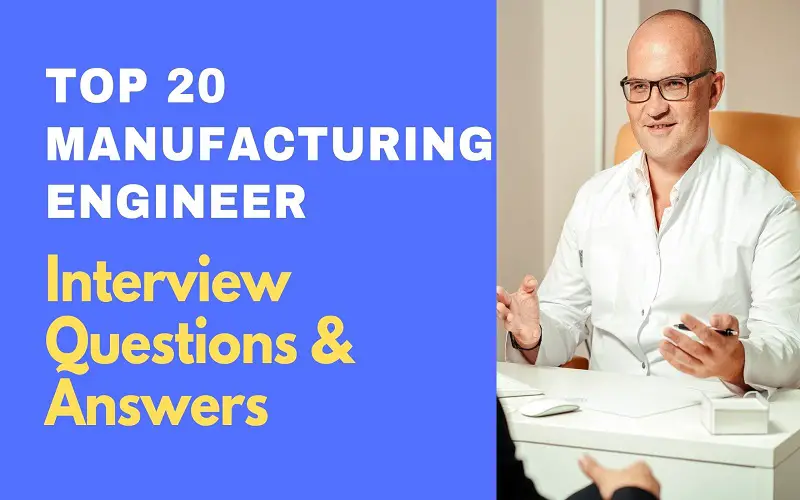Getting hired as a manufacturing engineer requires that you answer interview questions correctly. Below is a list of commonly asked questions to help you know what to expect. We have also provided a sample answer for each question.
1. Why Are You Interested In This Role?
Hiring managers want to find out whether you have read the job description well and if you are ready for the role. Express your excitement about this role.
Sample Answer
“I am interested in this role due to my desire to contribute to manufacturing processes. I am passionate about this job because of my extensive knowledge of manufacturing processes. I have a lot of experience in evaluating, developing, improving manufacturing systems and product design. I am an analytical thinker with strong troubleshooting skills. “
2. What Are The Roles Of A Manufacturing Engineer?
The recruiting manager wants to know whether you know the responsibilities of a manufacturing engineer. Share some roles of a manufacturing engineer.
Sample Answer
“Manufacturing engineers oversee and improve the manufacturing process. They are responsible for identifying areas for improvement, designing new processes and products, maintaining high levels of manufacturing and product quality, ensuring cost efficiency, ensuring conformance with regulatory standards, etc”
3. What Are The Qualities That A Manufacturing Engineer Needs To Be Successful?
The interviewer asks this question to find out whether you understand the qualities of a good manufacturing engineer. State a few qualities that a good manufacturing engineer should possess.
Sample Answer
“To be successful, a manufacturing engineer should
be able to develop and optimize manufacturing processes, work effectively within a team, have a high level of technical expertise, communicate effectively and organize.”
4. What Major Challenges Did You Face During Your Last Role? How Did You Manage Them?
The interviewer is evaluating your ability to handle challenges. Demonstrate that you have problem-solving skills and you can handle job-related stress.
Sample Answer.
“The biggest challenge was dealing with staffs who are reluctant to the changes you have made to a process. I realized that there was always a reason why they wouldn’t accept change easily. Finding out these reasons and knowing how to address them made us enjoy working with each other”
5. Describe Your Daily Routine As A Manufacturing Engineer?
The interviewer wants to know how you prioritize your work. Stay calm as you describe your day so that your interviewer can get an accurate idea of your communication style and personality.
Sample Answer
“I normally begin my day by having a meeting with the production management team. Here we discuss any job-related issue that may have occurred in the last 24 hours. Then, I walk around the plant to inspect as I also talk with other colleagues to get their input regarding the process we are using. For the largest part of the day, I work on new designs to improve our processes as well as the equipment we normally use. Other duties that I do include attending management meetings, handling administrative tasks, interface with vendors, etc”
6. Describe Briefly About Your Experience
The recruiters ask this question to get a better understanding of how your background and work experience relate to the position. Summarise your work history as you align to the job description in question.
Sample Answer
“My years of experience have prepared me well for this role. I have spent four years doing the following:
- Evaluating existing manufacturing processes as well as identifying areas for improvement
- defining manufacturing problems and implementing improvements
- Developing layouts for processes, equipment, and workflow
- developing new equipment, processes, and products.
- Designing and implementing quality control systems and cost-saving measures
- Ensuring manufacturing equipment, processes, and products comply with safety standards and legal regulations.
- documentation and preparing reports.
I will use the expertise I have gained to make his role a success.”
7. What Kind Of Strategies And Mindset Are Required For This Role?
This question allows your interviewer to understand the strategy and mindset you will put into use while performing your duties. Explain some of the strategies you will use when interacting with clients and other staff members.
Sample Answer
“This job requires a dedicated and result-oriented person. To remain profitable, a production line needs to be working for all the duration required. When a test fails or machine malfunctions, an engineer needs to be fast in making the line move again. They also need to know that safety, customer deadlines, and quality are very important.”
8. What Is The Biggest Challenge That You Foresee In This Job?
The recruiting manager wants to know whether you are ready and prepared for the challenges. Be honest with your answer and keep it brief.
Sample Answer
“The biggest challenge can be a large surplus of demand In a given time. However, knowing that Customer satisfaction is an integral aspect of any business, I will work under my power to ensure that every delivery is made on the due date or even before the deadline. My organizational skills will help me to achieve this as I know how to prioritize tasks.”
9. How Do You Stay Motivated In Your Work?
The interviewer wants to know what you value most. State some of the things you value in your profession and demonstrate how that makes you fit for the job.
Sample Answer
“The desire to learn and grow with a company keeps me motivated. I am enthusiastic to see my career growth and working in the manufacturing industry is motivating enough to keep me going|”
[VIDEO] Top 20 Manufacturing Engineer Interview Questions with Sample Answers: ► Subscribe for more useful videos
10. Describe A Time When You Failed In This Role And The Lesson You Learnt?
The recruiting team wants to know if you can own your mistakes and learn from them. Explain a situation you have ever found yourself including what you learned.
Sample Answer
“In my first year working in this field, a production line went down. As a manufacturing engineer, I knew that I was responsible for the maintenance and quality issues that take place during the production. Even if I didn’t know how to rectify the problem at the time, I maintained a professional attitude and pretended that I was looking into the matter. It took me time to accept that I could handle it until later in the evening when I sought help. The senior engineer came and discovered that a safety sensor had failed and that is why the line was down. We began the backup and the production resumed. This issue taught me how important teamwork is.”
11. Why Do You Feel You Are The Most Suited For This Role?
The interviewer wants to evaluate whether you are the best candidate for the job. Highlight your best traits, education, experience, skills, and competencies.
Sample Answer
“Besides holding a bachelor’s degree in mechanical engineering, I am a strong analytical thinker with a high level of technical expertise coupled with strong management and organizational skills. During my two years in manufacturing engineering, I have gained a lot of skills in CAM, CAD, data analysis programs as well as working with other related soft wares. I will be an added asset to your company especially in evaluating and troubleshooting manufacturing processes and machinery.”
12. Share With Us Your Greatest Achievement.
The interviewer asks this question to evaluate your job performance. Talk about your best workplace achievement and demonstrate your transferrable skills.
Sample Answer
“During my current role as a manufacturing engineer, we discovered that there was a problem with workers stripping out bolts on the assembly line. After conducting a careful analysis, I suggested switching to a different power tool. This tremendously enabled us to increase the speed of the line as at the same time there was a huge decrease in defects.”
13. Can You Describe The Term Bom And Tell Us How It Is Used In Manufacturing?
The interviewer asks this question to determine your qualification for this role. Demonstrate your skills and expertise when answering this question and ensure to use a little embellishment.
Sample Answer
“The abbreviation BOM stands for the bill of materials. It contains a list of apparatuses used to manufacture a product. It can also be defined as a supplier used in the process of manufacturing. Sometimes, it can be referred to the supplies and tools the employees use in a manufacturing environment.”
14. Explain What MES Is And How It Is Used
Here, the recruiting team wants to know how knowledgeable you are in this field. To answer this question, explain the meaning of the abbreviation then speak on how it is used.
Sample Answer
“MES stands for manufacturing enterprise system. This is an application that controls and manages production on the factory floor. It is mostly used to minimize the total time needed to produce an order. It collects data used for reviewing every process as well as optimizing it. For example, this application can identify bottlenecks caused by employees in the process of waiting for the components or when it seems difficult to access the required resources”
15. Why Do You Think It’s Important To Be Six Sigma Certified?
Six Sigma is an integral aspect of any manufacturer or organization. The interviewer wants to find out whether you are six sigma certified.
Sample Answer
“I’m a Six Sigma certified professional as a black belt. Six Sigma is a data-driven procedure for excluding defects in any manufacturing process to transactional as well as from product to service. It is important because it enables me to have the information needed to improve processes.”
16. Do You Have Experience Using Kanban?
The recruiting manager wants to know how you perform your job. If you are familiar with Kanban, state it and describe how you used it. If you have not used it, state the product you have used to perform similar tasks.
Sample Answer
“Yes, I have used it in my previous role. It is a scheduling system that enables manufacturers to decide what to produce, when to produce and how much to produce. It is a good system to use since it helps in keeping track of manufacturing components and supplies. It also provides the production team with all of the required information to perform a single application.”
17. Kindly Explain How You Can Calculate The Cost Of Manufacturing Work That Is Still In Progress.
This is a technical question that helps the interviewer to know your ability to calculate the costs involved in a manufacturing process. You should be aware of this including how to explain the concept.
Sample Answer
“I can account for the components such as raw materials, labor, factory overheads, and general administrative costs. I will use each of the stated components to calculate the cost of the manufacturing work still in progress”
18. Can You Provide Some Examples Of Factory Overhead?
The interviewer is asking this as a follow-up question to evaluate your knowledge of the terms you use when giving your answers. Talk in-depth on the concept as you demonstrate that you are comfortable with the question.
Sample Answer
“Some of the components of factory overhead include factory rent, insurance, utilities, administrative costs, equipment costs, depreciation and taxes among others.”
19. Where Do You See Yourself In 5 Years?
The interviewer wants to know if you are going to stay in your potential new position or not. Demonstrate that the position will satisfy you and that you will work hard and grow with the company for a long time.
Sample Answer
“I am really excited by this role at your company. In 5 years to come, I want to be referred to as someone with deep expertise in manufacturing engineering. I know that this is something that I will be able to get here. I look forward to taking more managerial roles in your company including leading some projects in the future”
20. When Can You Start Working If You Get Hired?
The interviewer wants to know when you are likely to take up the new position once you get hired. So, mention the day, week, or month you can begin working.
Sample Answer
“In my new contract, I am obliged to provide a 3 weeks’ notice before I can leave my current role. However, I can begin working the next day after I have met that obligation. I am so much eager to begin working here as well as meeting the rest of the team.”
Conclusion
You can emerge as the best candidate simply by mastering these questions and answers and demonstrating your know-how during the interview. Be bold and show interviewers that you have what it takes to perform the job as required.




